How To Change Privacy Settings In Domain_6
Advert blocker
In order to employ Opera'south built-in ad blocker, the feature must showtime be enabled in your browser. To enable Opera'southward advertising blocker, or to plow off ad blocker:
- Open up Opera and go toSettings (Alt+P)
- Nether Privacy protection, click the switch adjacent to Block ads…. This will enable Ad blocker.

The blue ad blocker badge![]() on the right side of the combined address and search bar shows that the characteristic is enabled.
on the right side of the combined address and search bar shows that the characteristic is enabled.
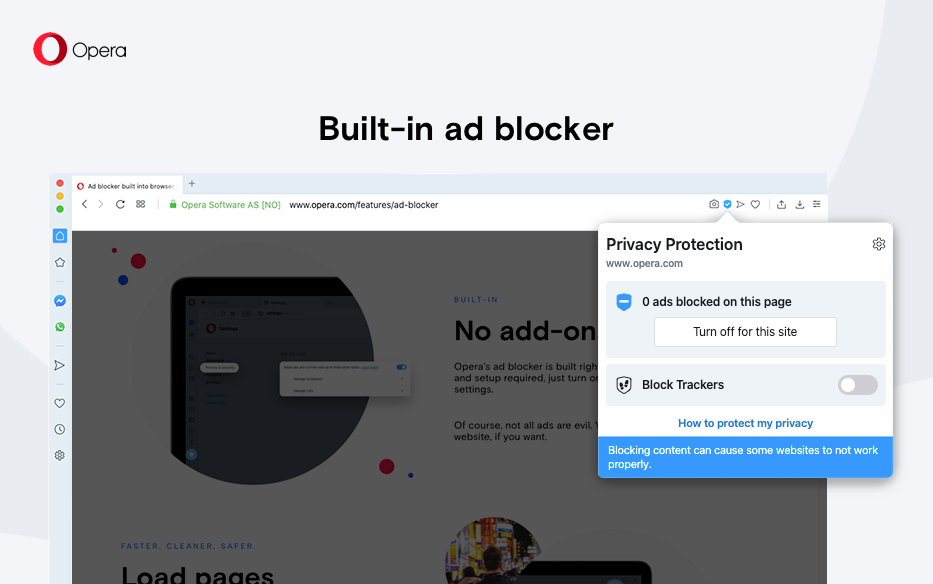
Click the ad blocker icon to open the advertising blocker pop-up window. In this window you can optionally disable ad blocker for the current website. Yous can also enable/disable the Tracker blocker, or click the gear icon to be taken to the settings page for ad blocker.
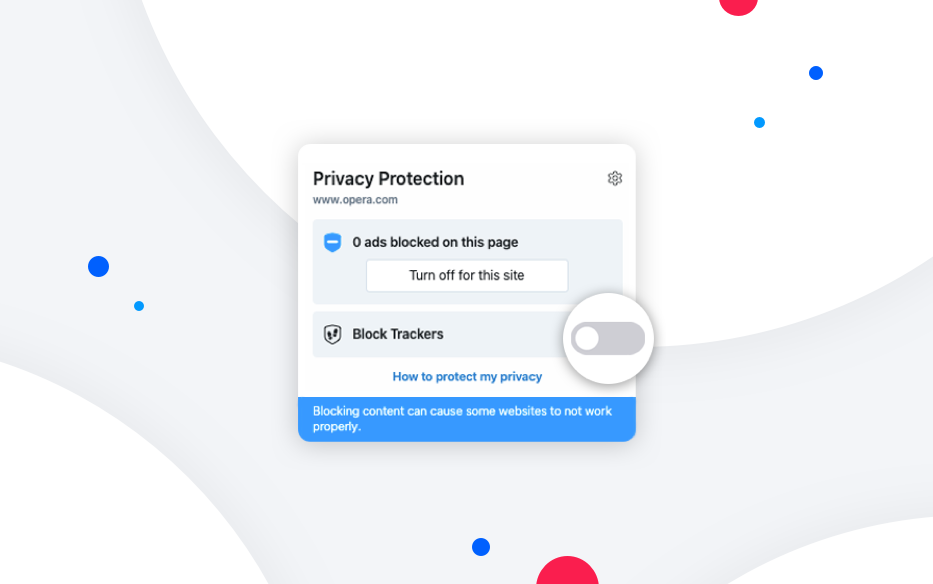
Whitelist a website in Opera'due south advertizement blocker
Some websites request that you disable ad blocker so you tin visit and fully enjoy their webpage. Instead of having to completely turn off Opera's ad blocker to visit i site, you can whitelist the requesting website.
To practise this, open up the ad blocker pop-up window in the combined address and search bar and click the Turn off for this site button. This volition disable ad blocker on that site. In the same popup, yous can also enable/disable the Tracker blocker, or click the gear icon to exist taken to the settings folio for ad blocker.

Opera'south ad blocker pauses when you visit a whitelisted website and resumes when you lot navigate to another website, allowing for an uninterrupted browsing feel.
The whitelisted website'south domain is added to your ad blocking exceptions list. Read below to larn how to manage exceptions for Opera'southward ad blocker.
Managing filter lists for Opera's ad blocker
You tin can choose which filter lists Opera's advert blocker uses when the feature is enabled. EasyList and NoCoin are enabled past default. To manage lists in Opera's ad blocker:
- Get toSettings.
- In Privacy protection, underBlock ads, click Manage lists.
- Check the boxes side by side to the lists you desire enabled for advertising blocker.
Opera updates your selected lists automatically. Yous tin update the lists manually by clicking the Update button at the tiptop of the page.
These lists, also known as filter lists, contain rules that tell ad blockers which content is probable to be an ad. The most popular and usually used list for removing ads on international websites is EasyList. Opera includes additional lists, such as EasyPrivacy, NoCoin, and lists for multiple languages, in order to remove ads.
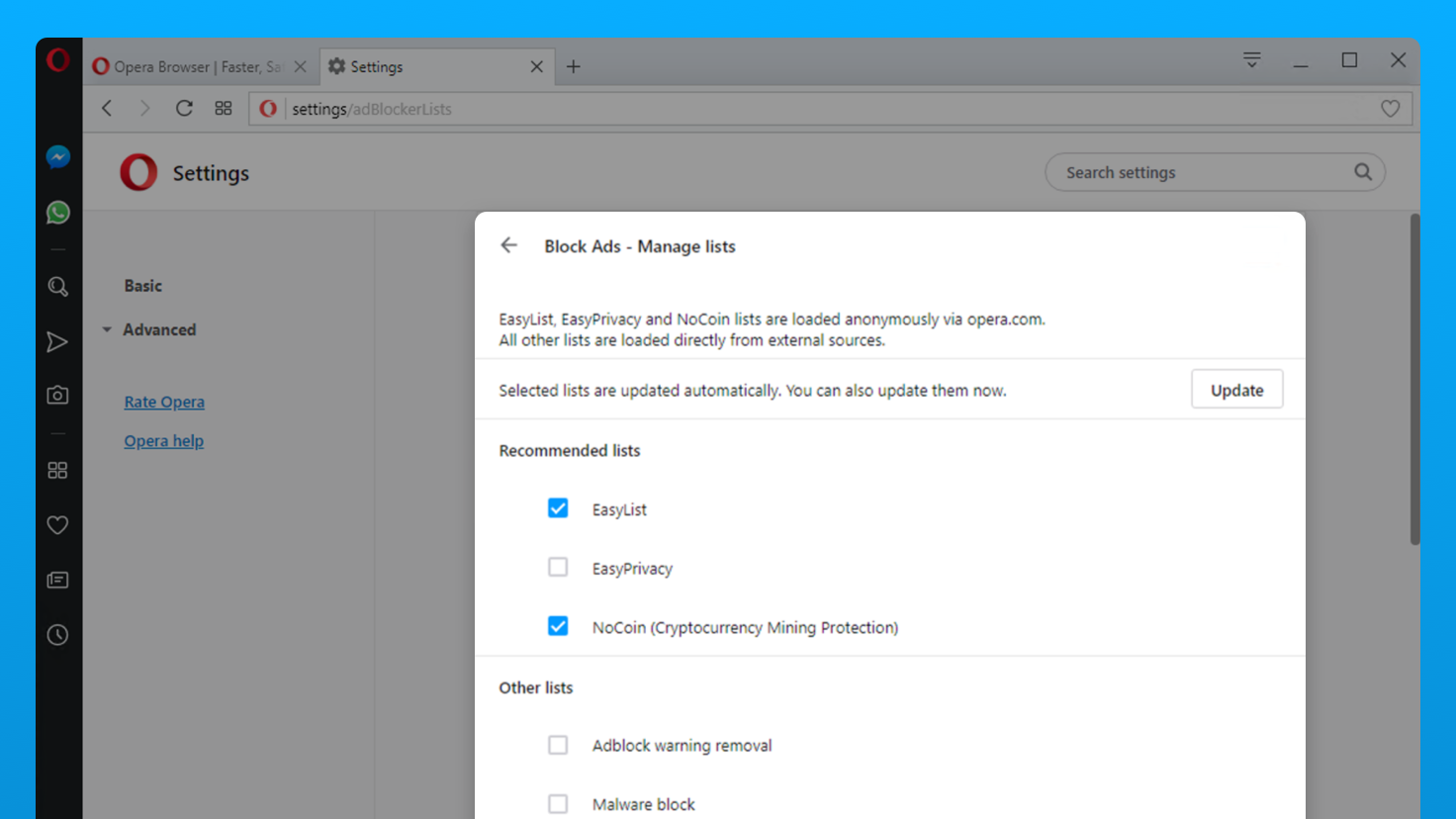
NoCoin is a cryptocurrency mining protection filter list which stops crytpojacking scripts from running on your computer. Read more about Opera's cryptocurrency mining protection.
Learn how to plow ad blocker on or off.
VPN
Normally, your browser connects direct to websites, allowing websites to place your IP address and approximate location. With VPN, you connect to websites via a VPN (virtual private network) server. As a result, your apparent location changes to the location of the server. To enable VPN:
- Go to Settings.
- Click Advancedin the left sidebar, and click Features.
- UnderVPN, turn onEnable VPN.
When you enable VPN, it starts automatically, and a VPN badge ![]() appears in the combined address and search bar. Click on the badge, and you volition encounter an on/off switch, information about the corporeality of data transferred, the virtual location, and the virtual IP address.
appears in the combined address and search bar. Click on the badge, and you volition encounter an on/off switch, information about the corporeality of data transferred, the virtual location, and the virtual IP address.
From the point of view of websites, your browser is now located in the region given past the virtual location. To modify your virtual location, select a region from the list. If yous do not choose a region, you are automatically assigned an optimal location. To turn off VPN, flip the switch in the badge.
Because the connection from your browser to the VPN server is encrypted, even if the local network is non, VPN enhances your privacy on the local network. Y'all tin hide your browsing activities from other users of that network.
To enhance your privacy with regard to websites, making it more hard for them to rail you, you demand a combination of features. The result is cookies. Fifty-fifty if you disguise your location, websites can all the same identify you if they have ready a cookie. Notice, withal, that past blocking ads you block the source of many tracking cookie. At the end of a private browsing session, when yous shut the browser, all cookies from that session are deleted.
VPN is a free service, and the amount of data you are immune to transfer is unlimited.
Private window

Private browsing ensures that your internet history and activeness data is removed every bit soon as you close all private windows.
- To browse privately on Windows and Linux, become to
 Card > New individual window.
Card > New individual window. - To browse privately on Mac, selectFile > New Private Window (Ctrl+Shift+Due north).
When y'all close all private windows, Opera will clear the following associated data:
- Browsing history
- Items in cache
- Cookies
Afterward being closed, a private tab or window cannot be recovered from theRecently Closed list in the tab menu.
While private windows practise not exit whatsoever tape of the websites yous visit, if you deliberately save data – for example, if yous save an detail to your Speed Dial, salve a password, or download a file – it volition nevertheless be visible after the window is closed.
Clear browsing data
By default, Opera stores sure browsing data to help speed up connections, load common page elements, and ameliorate your interaction with the sites you visit. You may wish to remove traces of your browsing habits past clearing your browsing data. To clear browsing information:
- Go toSettings.
- ClickAdvanced in the left sidebar, and click Privacy & security.
- UnderPrivacy and security, clickClear browsing information.
- Select a time range and the types of data y'all wish to clear, and clickArticulate data.
Browsing history – A list of sites you have visited.
Download history – A record of the files you've downloaded. Clearing this will not delete the file you downloaded, just the tape of where and when.
News usage data – Information on the frequency and the length of fourth dimension yous spend on a news article from the personal news page, which is used to customize what news you lot see.
Cookies and other site data – Data from websites you visit which is stored on your computer, such as site preferences and login status.
Cached images and files – Data stored on your calculator by applications or websites to brand processes and site loading faster. Should be cleared periodically.
Passwords and other sign-in data – Information related to logging into websites and applications. Allows y'all to exist signed-in automatically.
Autofill form data – Information like credit-bill of fare numbers, names and phone numbers, which y'all can choose to shop on your estimator in order to have forms filled in automatically.
Site settings – Permission data for websites, such as whether they tin can access your microphone or send yous cookies.
Hosted app data – Data stored by extensions you lot have installed in your browser. Clearing this data will reset the extension to its default.
Clearing your browsing history will delete whatsoever stored location data about the pages you lot have viewed and the times you accessed them.
Clearing download history will empty Opera'southward tape of the files yous've downloaded through the browser. This will non delete the file from your local car, just the record of when and where you downloaded it.
Deleting cookies and other site information volition remove any tracked site data. Read more than nigh managing cookies.
Emptying your browser's cache will delete any temporarily stored data from websites. The cache is used to briefly store page elements such as images or search queries. Cached data also helps reduce loading times when you wish to access a recently visited site. Emptying enshroud will clear up space on you local disk.
Clearing data from hosted apps volition delete any data stored by extensions y'all take installed in the browser. For example, if y'all installed a weather extension on Speed Dial and gear up your location in its settings, immigration this information volition reset the extension to its default and yous will have to tell the extension your location again. Note: Take care not to erase useful data inadvertently. If you are non already familiar with it, try private browsing. The data for individual browsing is automatically cleared when you shut all individual windows.
Managing how Opera stores private information may be useful, equally an alternative to immigration all private data. Read more nigh setting web preferences.
Security badges
Opera warns you lot almost suspicious pages by checking the page you request confronting a database of known phishing and malware websites. To protect yourself when entering sensitive information, always look for the![]() lock in the security badge to the left of the combined accost and search bar.
lock in the security badge to the left of the combined accost and search bar.
Badges betoken details about the page you lot are viewing. When a badge appears in your combined address and search bar, click information technology to see more information, including security certificates and more.
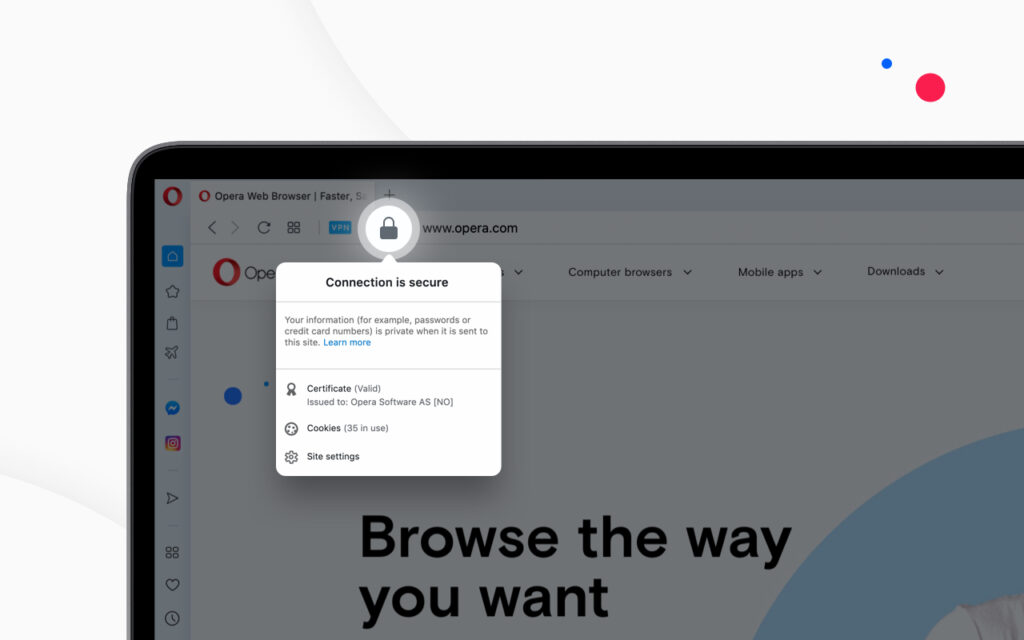
| Icon | Indicates… |
|---|---|
| | Compressed connection |
| | Ads are blocked |
| | Camera admission |
| | Extension |
| | Fraud or malware warning |
| | Local file |
| | Location access |
| | Microphone access |
| | Opera folio |
| | Secure connexion |
| | Unprotected connection |
| | MIDI access |
| | VPN is on |
When the connection is secure, a lock is displayed in the security badge, implying that no one else can read the information that passes between you and the site. Opera uses certificates to verify the identity of the site owners. A lock means in that location is expert encryption between you and the recipient, and the recipient's identity has been verified.
If a website is blacklisted, you will be presented with a alarm folio, and you lot can determine whether to visit the website or to go back safely to the previous folio. Fraud and malware protection does not cause any filibuster in the opening of pages.
Manage security certificates
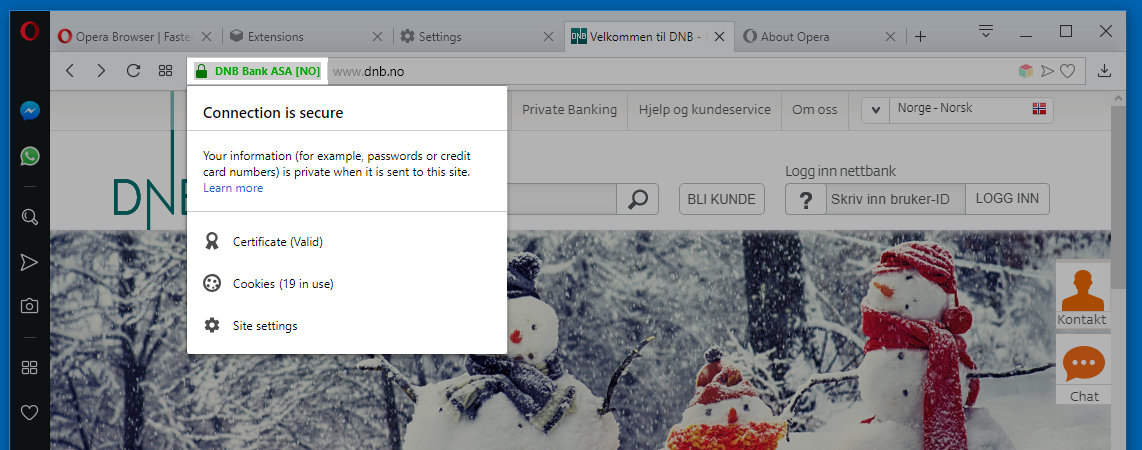
HTTPS (Hypertext Transfer Protocol Secure) is a widely used technology that provides encrypted advice and identity assurance on the Internet. Security certificates are used to verify the ownership of Internet domains. If y'all encounter a black padlock security bluecoat in your combined address and search bar, then according to your operating system's configuration, you lot are deeply connected to the website. Even so, it is nonetheless your responsibility to make sure that the address is correct. When in doubt, type the address past hand.
If y'all'd like more data about a site'due south security certificate, click on the security badge and click the Certificate (Valid) link. Opera will provide the certificate's issuer, the type of certificate, and whether the issuer is publicly-known and valid.
Publicly-known issuers and their certificates are validated against a number of security and identity checks. Opera will warn you if some role of a publicly-known issuer's certificate is questionable. You may choose to proceed but Opera cannot guarantee your security.
To meet which HTTPS/TLS certificates are used by your Opera browser and how Opera handles them:
- Go to Settings.
- Click Advanced in the left sidebar, and click Privacy & security.
- Nether Privacy and security, click Manage certificates.
A note about local certificate issuers
Some connections tin be certified by certificates from local issuers, either from apps on your machine or other non-public sources (such as a local intranet). These issuers tin can be used to verify secured connections in the browser. Virtually of these connections are valid. For example, debugging applications, third-political party security scanning, and parental filters may rely on locally-issued certificates.
Connections certified past certificates from local issuers aren't screened by the same security standards as publicly-known issuers and certificates. Such screening is too strict and may not permit connections to piece of work as intended. Malware or viruses may use these certificates to view encrypted information or inject ads.
If you wish, you can configure Opera to warn you almost public sites that employ certificates from local issuers. If you proceed to browse on these connections, be aware that some security measures, such equally certificate pinning and Certificate Transparency, will exist disabled for all such connections during your browsing session.
Review how to manage security certificates.
Invalid document warnings in Opera

If Opera cannot verify the identity of the server for a website you wish to visit, y'all will see this popular-upwardly. Click Show certificate to review the certificate yourself. When reviewing the certificate, check that the certificate'southward validity appointment is current and that the issuer of the certificate is trusted.
Click Go along anyway to proceed to the website.
If you exercise non trust the server or the certificate and you lot wish to not proceed to the website, click Abolish.
A note well-nigh Extended Validation (EV) certificates
The best guarantee of a website'due south identity is provided by Extended Validation (EV) certificates. Extended Validation means that the details of the organization ownership the document have been audited by an answerable, third-party entity, who tin can therefore verify that the document owner is who it claims to be. EV websites are indicated past a black security bluecoat with a padlock in the address field.
Extended Validation certificates are designed to endorse a company'southward validity every bit a reliable, rather than transient, business organisation. For example, to obtain a certificate, a company must provide three years of tax records and other financial data to the Document Potency. This certification provides peace of mind and security for Net shoppers.
Opera has already implemented procedures and processes for EV certification and is at the forefront of complying with standards. Nosotros have congenital-in procedures to automatically verify that everything in a certificate for a website is correct when someone visits a folio on the site and that the document has not been revoked.
Tell sites to not track your action
Most sites track your beliefs while you visit them. If y'all do non similar this thought, Opera tin send an additional header with every request: "DNT: 1". This is a flag to websites that the user does non want to be tracked. Some countries accept DNT legislation that will legally protect your request and well-nigh well-behaved websites volition respect this additional header.
You can set Opera to tell sites you adopt to opt-out of online behavioral tracking. To set this:
- Go to Settings.
- Click Advancedin the left sidebar, and whorl downward to Privacy & security.
- Click Cookies and other site data.
- Under Cookies and other site data, turn onSend a "Exercise Not Rails" request with your browsing traffic.
A note about phishing and malware
Opera's fraud and malware Protection warns you well-nigh suspicious web pages and is enabled by default. It checks the requested folio against several databases of known phishing and malware websites, called blacklists. Although it is non possible to totally eliminate the risk of encountering an unidentified phishing or malware website, the risk is minimized.
Notation that checking against the database does non delay the opening of web pages.
Phishing
The growth of Internet commerce has given online criminals an opportunity to steal your passwords, your credit card numbers, and other personal data by impersonating authority figures from your banking concern or other institutions you frequent. This is known every bit phishing.
You volition be encouraged to log in and "verify" your customer information: in other words, to reveal your password, credit card number, or other private data. The all-time defence against this threat is to be aware of the trouble and to be alert when transacting business concern online.
Malware
For the aforementioned reason that y'all accept anti-virus software installed, y'all may desire protection from websites that distribute viruses or other malicious software, collectively known every bit malware. The concept of malware encompasses not just viruses, but also scripts that may run automatically when yous load a web page.
Source: https://help.opera.com/en/latest/security-and-privacy/

0 Response to "How To Change Privacy Settings In Domain_6"
Post a Comment